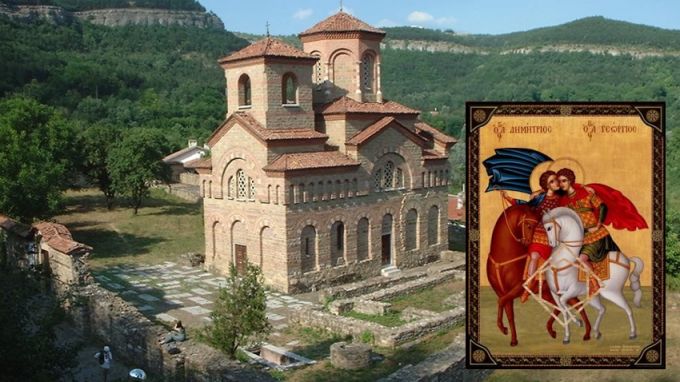
Along with traditional meals including lamb and mutton, anybody who strictly abides by traditions should prepare a chicken stew. Boiled corn, damson cheese, baked apples and pumpkin jam are also served.
There are many churches in Bulgaria named after St. Demetrius. These include the oldest medieval church in Veliko Tarnovo where the Bulgarian tsars from the Asenev dynasty were crowned – Petar, Asen and Kaloyan. Here on 26 October 1185 (on the Day of St. Demetrius) the Asenev Uprising was declared against the Byzantine yoke.
In Bulgarian folklore St. Demetrius is a courageous man with supernatural powers. To celebrate his feast he arrives on horseback bringing winter and cold, and snow falls from his beard. The feast is also linked to paying homage to the dead. According to some legends the saint is a brother of At. Archangel Michael who takes away the souls of the dead. On the Saturday before the feast (called Dimitrovden) the so-called Demetrius All Souls Day is organized. In the past, on 26 October the landlords would release from their jobs seasonal workers like farmhands, shepherds etc. hired on Gergiovden (St. George’s Feast on 6 May). To mark the end of the farming season everybody gathered for a big celebration with plenty of food.
The lyrics of an ancient folk song quoted by Bulgarian ethnographer Prof. Dimitar Marinov recount the story of the saint who together with his brother Michael put to fire Mount Athos and the monasteries there. The two were condemned and locked up for three years at the bottom of the sea. „They served three years of imprisonment and three years farmhands did not know their day, shepherds did not know their term of service and not even a drop of rain fell…“. St. Petka and St. Nedelya (who according to this song were St. Demetrius’s aunts) went to visit Our Lord and pleaded to Him to release the prisoners. However He refused with the words: “Mitre is not for release, Mitre is for extermination” (the name Mitre is a local version of Dimitar). Then the two women saints went to visit Virgin Mary and she helped for the release of Mitre.
Another legend presents St. Demetrius as the twin brother of St. George. The twins divided the year in two equal halves. St. George received the summer and St. Demetrius – the winter. This division applies to the farming year – from Gergiovden (St. George’s Feast) the spring-summer cycle of farming work begins and from Dimitrovden (St. Demetrius’s Feast) – the autumn-winter one.
Once upon a time the period around Dimitrovden was the right time to complete construction of new houses. According to the custom, a new house’s owners had to cull a ram and invite the whole village to water-bless the house. That's why builders celebrate this day as their professional day. Dimitrovden was the day to make predictions about the coming year: if the moon was full, beehives would be filled with honey and the bees would swarm. On the eve of the feast the shepherds tossed a stick in the sheepfold. If the sheep lay on it in the morning, it was believed that the winter would be long, tough and cold.
Like on St. Ignatius’s Feast (Ignazhden) predictions about the future were made depending on who would be the first guest entering a house. If he was a good and prosperous man, the year would be good for the family of the hosts too.
English Daniela Konstantinova
For the first time, two of the most mysterious archaeological sites in the Eastern Rhodopes have been studied in detail from air. Bulgarian archaeologists scanned the Harman Kaya rock complex near the village of Bivolyane and the ancient Asara fortress..
After the Liberation in 1878, Bulgaria began to develop at a pace that would make up for the centuries-long absence from the world history map. Young Bulgarians graduated from prestigious European universities and took their knowledge to their homeland..
One of the three biggest Hebrew holidays, Pesach (Passover) starts at sundown (5 PM) on 22 April and ends on 30 April. It is a movable feast, falling after the 14 th day of the spring month of Nisan which starts after the spring equinox with the..
For the first time, two of the most mysterious archaeological sites in the Eastern Rhodopes have been studied in detail from air. Bulgarian archaeologists..

+359 2 9336 661
